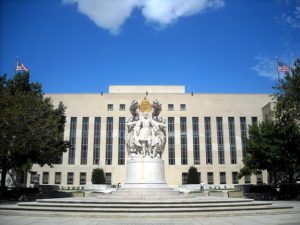
Oral arguments in the case of Taylor vs. Huerta, a case that challenges the legality of the FAA’s drone registration program, began last week – and the FAA did not appear to emerge with victory at hand.
The FAA’s drone registration program was instituted just before the holidays in 2015. The drone registration program – Part 48 of the Code of Federal Regulations (CFR) – requires all drone operators including recreational drone operators to register, paying a $5 fee and providing their contact information. The contact information relates to a registration number which is supposed to be displayed on the aircraft.
There have been a number of arguments against the registration program: the FAA did not adhere to mandated commenting periods, claiming that the 2015 holiday season constituted an “emergency” which exempted the agency from following the required process for rulemaking; the database requires address information from minors which may be available to the public; and there are many arguments about the privacy rights of drone operators. But John Taylor, a drone operator and attorney from Maryland, chose the clearest one when he took on the David vs. Goliath case last year: Section 336A of the FAA Modernization Act says that the FAA can’t enact new regulations with regards to model aircraft. Part 48 appears to be a new regulation.
SEC. 336. SPECIAL RULE FOR MODEL AIRCRAFT.
(a) IN GENERAL.—Notwithstanding any other provision of law relating to the incorporation of unmanned aircraft systems into Federal Aviation Administration plans and policies, including this subtitle, the Administrator of the Federal Aviation Administration may not promulgate any rule or regulation regarding a model aircraft, or an aircraft being developed as a model aircraft, if—
(1) the aircraft is flown strictly for hobby or recreational use;…
In a clear and concise argument, Taylor laid out his case before the judge: the FAA was in violation of Section 336 (a) when it enacted a new rule regarding model aircraft flown for recreational use. When you’ve said that, you’ve said it all: “I’m reluctant to move on past it,” said Taylor at one point in his argument, referring to Section 336 (a). “But I don’t really know what more to say about it.”
In addition to the issue of legality, Taylor points out that the FAA’s argument that registration is necessary for enforcement is a false one. The FAA’s response to a FOIA request he sent last May indicates that the agency has no records of a model aircraft ever being traced through its registration number. The rule “didn’t protect anyone from real harm,” said Taylor. “It’s never been used.”
The FAA’s argument in defense of Part 48 is that despite appearances, it isn’t a new rule. Aircraft have always required registration – see Part 47 – and they’ve just provided a convenient means for drone operators to register. The fact that drones or model aircraft had never before been included in the interpretation of Part 47 makes no difference, according to the agency. The FAA representative argued that FAA is allowed to “exercise discretion with regards to enforcement,” and that the agency would be “hamstrung” in enforcement without registration.
The judges in the case, however, did not appear entirely convinced when questioning the FAA representative. “Where are you getting these words from?” the judge asked the FAA representative, who stumbled over the exact phrasing of Part 336 (a). “You’re just making stuff up… that’s not what the statute says.”
“Your argument is very strange to read,” commented the judge. “I wouldn’t write anything like that… I’d be laughed out of the business.”
In response to the FAA’s argument that Part 48 met the FAA’s goals for both enforcement and education, and that over 700,000 drone operators had already registered, the judge was dismissive. “That’s a policy argument,” he stated. “The fact that the thing you’re doing has good effect doesn’t mean that the thing is lawful.”
The 30-minute recording of the oral arguments can be heard here.
Miriam McNabb is the Editor-in-Chief of DRONELIFE and CEO of JobForDrones, a professional drone services marketplace, and a fascinated observer of the emerging drone industry and the regulatory environment for drones. Miriam has penned over 3,000 articles focused on the commercial drone space and is an international speaker and recognized figure in the industry. Miriam has a degree from the University of Chicago and over 20 years of experience in high tech sales and marketing for new technologies.
For drone industry consulting or writing, Email Miriam.
TWITTER:@spaldingbarker
Subscribe to DroneLife here.